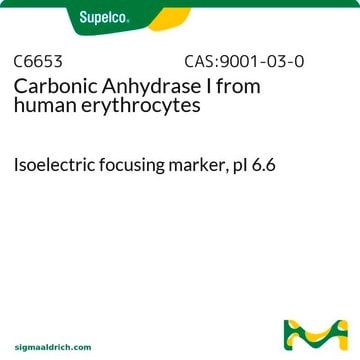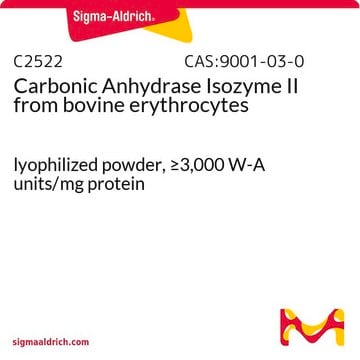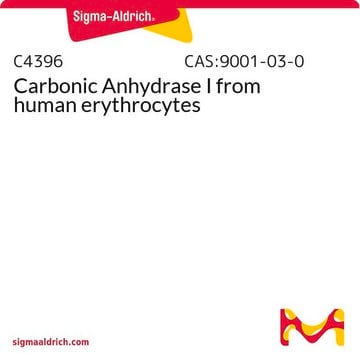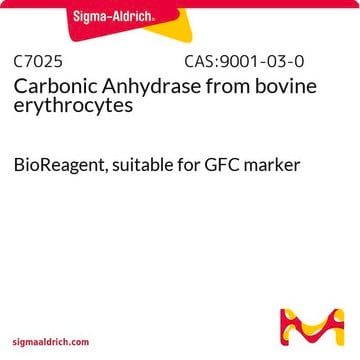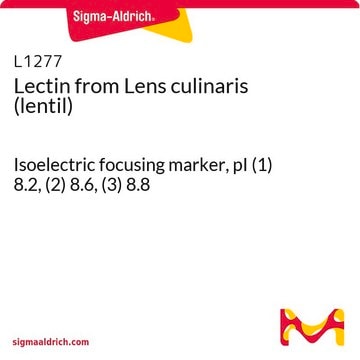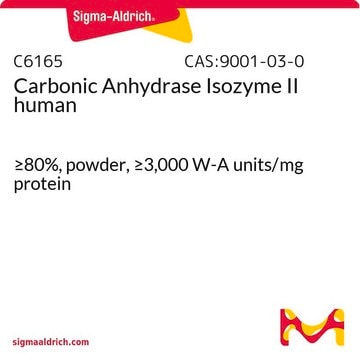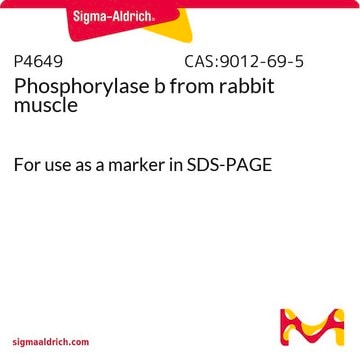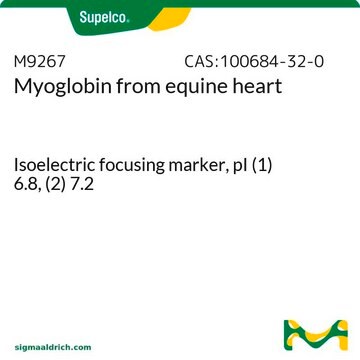C3666
Carbonic Anhydrase Isozyme II from bovine erythrocytes
Isoelectric focusing marker, pI 5.4
Synonym(s):
Carbonate Dehydratase, Carbonate Hydrolyase, Carbonic Anhydrase II
Sign Into View Organizational & Contract Pricing
All Photos(1)
About This Item
Recommended Products
Quality Level
form
powder
packaging
vial of ~1 mg protein
pI
5.4
solubility
deionized water: soluble, clear to slightly hazy, colorless (Dissolve vial contents in 0.25mL of deionised water.)
storage temp.
−20°C
Looking for similar products? Visit Product Comparison Guide
Preparation Note
Dissolve in 0.25mL of deionized water. The solution is colorless, clear to slightly hazy.
Signal Word
Danger
Hazard Statements
Precautionary Statements
Hazard Classifications
Resp. Sens. 1
Storage Class Code
11 - Combustible Solids
WGK
WGK 3
Flash Point(F)
Not applicable
Flash Point(C)
Not applicable
Personal Protective Equipment
dust mask type N95 (US), Eyeshields, Gloves
Choose from one of the most recent versions:
Already Own This Product?
Find documentation for the products that you have recently purchased in the Document Library.
Customers Also Viewed
J Gao et al.
Biophysical journal, 76(6), 3253-3260 (1999-06-04)
This paper describes the use of electrospray ionization-Fourier transform ion cyclotron mass spectrometry (ESI-FTICR-MS) to study the relative stabilities of noncovalent complexes of carbonic anhydrase II (CAII, EC 4.2.1.1) and benzenesulfonamide inhibitors in the gas phase. Sustained off-resonance irradiation collision-induced
Ryuta Saito et al.
Acta crystallographica. Section D, Biological crystallography, 60(Pt 4), 792-795 (2004-03-25)
Carbonic anhydrase (CA) is a zinc-containing enzyme that catalyzes the reversible hydration of CO2 to HCO3-. In eukaryotes, the enzyme plays a role in various physiological functions, including interconversion between CO2 and HCO3- in intermediary metabolism, facilitated diffusion of CO2
Barend Andre Stander et al.
PloS one, 7(12), e52205-e52205 (2013-01-10)
Antimitotic compounds are still one of the most widely used chemotherapeutic anticancer drugs in the clinic today. Given their effectiveness against cancer it is beneficial to continue enhancing these drugs. One way is to improve the bioavailability and efficacy by
Yuzhu Bian et al.
Artificial cells, nanomedicine, and biotechnology, 41(1), 60-68 (2013-01-26)
Even though erythrocytes transport both oxygen and carbon dioxide, research on blood substitutes has concentrated on the transport of oxygen and its vasoactivity and oxidative effects. Recent study in a hemorrhagic shock animal model shows that the degree of tissue
Tristan J Horner et al.
Proceedings of the National Academy of Sciences of the United States of America, 110(7), 2500-2505 (2013-01-31)
The global marine distributions of Cd and phosphate are closely correlated, which has led to Cd being considered as a marine micronutrient, despite its toxicity to life. The explanation for this nutrient-like behavior is unknown because there is only one
Our team of scientists has experience in all areas of research including Life Science, Material Science, Chemical Synthesis, Chromatography, Analytical and many others.
Contact Technical Service